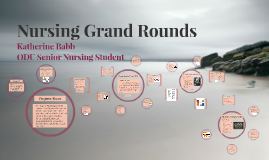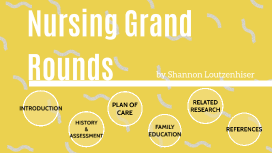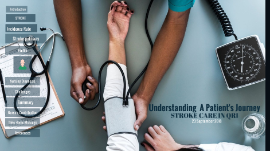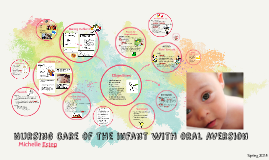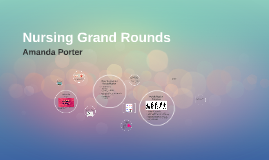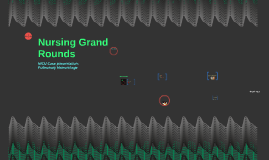Nursing Grand Rounds
Transcript: Treatment Plan Chief Reason for Admission: Abdominal Pain Primary Medical Diagnosis: Relapsed Stage IV Neuroblastoma Secondary Diagnoses: - Fever and Neutropenia r/t chemotherapy - Diarrhea r/t chemotherapy Circumstances Leading to Hospitalization Surgery Chemotherapy Radiation Stem Cell/Bone Marrow Transplantation Retinoid Therapy References ("Neuroblastoma", 2015) ("Neuroblastoma", 2015) Neuroblastoma Age: 9 Primary Medical Diagnosis: Relapsed Stage IV Neuroblastoma Secondary Medical Diagnoses: - Fever and Neutropenia - Diarrhea Chief Complaint: Abdominal Pain Amanda Porter ODU Senior Nursing Student Cultural Considerations "Evaluating the acceptability and efficacy of a psycho-educational intervention for coping and symptom management by children with cancer: a randomized controlled study" Journal of Advanced Nursing Psycho-educational intervention programme "Provide information about treatment management and to facilitate the identification and use of effective skills to manage physical symptoms, including cognitive and/or behavioral modifications" Conclusion: The intervention was acceptable for pediatric oncology patients and reduced GI problems and pain Hockenberry, M. & Wilson, D., (2010). Nursing care of infants and children, (9th ed.) . St.Louis, MO. Elsevier. Neuroblastoma. (2015). Retrieved October 5, 2015. Neuroblastoma - Childhood - Treatment Options. (2012, June 25). Retrieved October 5, 2015. Sposito, A. P., Silva-Rodrigues, F. M., Sparapani, V. C., Pfeifer, L. I., de Lima, R. G., & Nascimento, L. C. (2015). Coping strategies used by hospitalized children with cancer undergoing chemotherapy. Journal Of Nursing Scholarship, 47(2), 143-151. doi:10.1111/jnu.12126 Wu, L., Chiou, S., Sheen, J., Lin, P., Liao, Y. M., Chen, H., & Hsiao, C. (2014). Evaluating the acceptability and efficacy of a psycho-educational intervention for coping and symptom management by children with cancer: a randomized controlled study. Journal Of Advanced Nursing, 70(7), 1653-1662. doi:10.1111/jan.12328 "Coping strategies used by hospitalized children with cancer undergoing chemotherapy" Journal of Nursing Scholarship Children need to cope with hospitalizations, pain, medications, side effects, idle time and uncertainty regarding the success of treatment Conclusion: Children develop coping strategies which were effective while undergoing chemotherapy WP's Method: Conversation, watching his favorite shows, and video games Primary Focus: Reinforcement Hygiene habits Nutritional choices, eating frequently Understanding seizure precautions Self-Care and ADLs Holistic Nursing Care Teaching and Patient Outcomes Pertinent Health History Developmental Considerations What is a Relapsed Stage IV Neuroblastoma? Neuro: Nerves Blastoma: Cancer that affects immature/developing cells Starts in certain very early forms of nerve cells or neuroblasts in an embryo or fetus During maturation some neuroblasts may become cancerous and cause a neuroblastoma (a malignant tumor composed of neuroblasts that typically occurs on the adrenal gland) ("Neuroblastoma", 2015) Medical History and Physical Exam Blood and Urine Catecholamine Tests Routine Labs Imaging Tests (MRI, CT, PET, etc.) Biopsies Patient: W.P. Family/Psychosocial History Nursing Grand Rounds Missing the first day of school due to hospitalization Being the "sick" child in the family Feeling different than his peers (ie. travel, hospitalizations, taking medications) Most common cancer in infants (less than a year old) Accounts for 6% of all cancers in children Approximately 700 new cases each year in the US Rarely found in children over the age of 10 Nearly 90% of all cases are diagnosed by age 5 Cardiovascular - Double R IVAD - History of HTN Musculoskeletal - Weak, unsteady gait Genitourinary - Diarrhea associated incontinence - Decreased urine output WP is a rising 4th grader He lives with Mom, Dad and 2 younger brothers Has 2 dogs and 1 cat He is 9 years old and very interested in The Walking Dead and Pokemon Staging Physical Assessment (Li-Min et. al, 2014) Erik Erikson: "Crises" Theory "Industry (Competence) vs. Inferiority" - Age: 6 to 12 - Goal: Achieve a sense of interpersonal competence through technological and social skills Due to illness, WP faced several challenges to this stage - Stress of illness preventing him from meeting societal and social benchmarks - Feelings of inferiority Based upon the "5-year survival rate" Low-risk: >95% Intermediate: 90-95% High-risk: 40-50% Prognosis/Survival Traditional Complimentary/Alternative Collaborative Nursing Research Integrate knowledge from the sciences, developmental theory and physical assessment data for the plan of care of a pediatric client and family in the acute care setting Formulate a holistic plan of care for the patient and family Developmental Considerations Jean Piaget: Theory of Cognitive Development "Concrete Operational Phase" - Age: 7 to 11 - Children are able to use their thought processes to experience events






